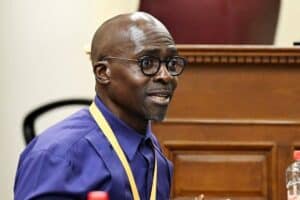An education expert says the factors contributing to pupils’ poor reading performance had to do with the inequalities in society.

It is time for Basic Education Minister Angie Motshekga to go after the latest reading survey revealed 81% of Grade 4 pupils could not read for meaning – and had regressed to 2011 standards.
That is the call from DA shadow minister of basic education Baxolile Nodada.
“It is time Motshekga was fired,” said Nodada. “She is continuously failing generations of pupils: 14 years of massive regression and little progress.”
ALSO READ: Less than 20% of SA’s grade 4 pupils can read for meaning, minister blames Covid
Nodada said it was possibly more concerning “56% of South African Grade 6 pupils cannot read for meaning when tested on the same Grade 4 evaluation” in the Progress in International Reading Literacy Study (Pirls).
“Although 21 of 57 participating countries showed a decline in results due to the effects of the Covid pandemic, South Africa scored significantly lower than all in the Grade 4 tests.
“In fact, South Africa had the largest decline in reading outcomes, with our pupils lagging more than three years behind Brazilian children,” Nodada said.
Pupils will drop out
The lack of proficiency in reading will have far-reaching consequences for pupils, said education expert Dr Muavia Gallie.
Gallie said such pupils are at risk of dropping out during their early grades due not been able to read.
“Reading is the skill by which pupils get information from books, computers, worksheets and boards to learn their subject content such as mathematics, science and history.
“This is a design problem that should be solved by the department of basic education, since teachers should be given guidance from it,” said Gallie.
ALSO READ: Literacy crisis deepening in South Africa, says new report
“However, the districts should be more proactive in supporting teachers at school level, rather than workshopping teachers outside their working context and implementing the reading strategies within the school.”
According to Gallie, there is no structured process of how many words pupils need to learn and understand for each of the foundation phase grades.
“This structure is in place in most countries in the world, while we have been silent in this structure which must come from the department, and not from reading foundations that work with schools.”
Inequalities in society
Another education expert, Mary Metcalfe, said the last findings by Pirls provided a detailed examination of the factors contributing to pupils’ poor reading performance and that many of these had to do with the inequalities in society.
“It is the children from the most disadvantaged social backgrounds who struggle the most in early reading. For example, these children do not have enough access to enough books to read for pleasure, at the right level, and in their home language regularly… children learn to read by reading,” said Metcalfe.
ALSO READ: Every child has right to education
“If children are not reading confidently in their home language – and in the language of instruction – they struggle as the curriculum expands from Grade 4 to more content subjects.”
Metcalfe said investment in improving reading and numeracy needed to be targeted.
Two of the country’s biggest teachers’ unions, the South African Democratic Teachers’ Union (Sadtu) and the National Professional Teachers’ Organisation of South Africa (Naptosa) also expressed concern.
National crisis
According to Sadtu general secretary Mugwena Maluleke, it was important to address systemic issues urgently.
“We need each of the education role players to treat this as a national crisis. The lack of language clinics, no access to speech therapist and occupational therapists contribute to this crisis,” Maluleke said.
Basil Manuel of Naptosa said some of the obvious things included insufficient graded readers in schools, as well as teachers who are not trained to teach reading. Manuel believed universities were doing a bad job when it came to the science of teaching reading.
ALSO READ: We need to edge closer to closing the gap in the quality of education
“Then the reading methodology we use: there are a multitude of methods but no recommended one – and there has been no strategy to teach teachers in the primary schools to teach reading.
“All primary teachers need the skill and not only foundation phase. “I believe the minister needs to crack the whip on universities we fund to train teachers,” said Manuel.
“We need to prescribe the training of pre-service teachers in reading science.
“Naturally, school simply gets tougher and more difficult if you cannot understand what is written.”






